Nanchen Dongfang
Interview by Carey Sargent, EPFL, NCCR MARVEL
Have you always been interested in science?
When I was younger, I was very interested in mathematics. In high school in China students had to choose between natural science and liberal arts and I was attracted by physics and chemistry. I also got encouragement from my physics teacher who told me not to care about the opinion that girls are supposed to learn liberal arts rather than sciences, so I chose natural sciences. And then, the university I went to, Fudan, has a great reputation for macromolecular sciences and so I chose it as a major. While I was doing my bachelor’s project related to advanced composite materials, computational chemistry, unlike traditional experimental chemistry, was a very new field for me, but I was deeply moved by it: ab initio simulations could provide detailed explanations for observations in experiments. So, I made the decision to study computational chemistry next. When I applied for a master’s program I contacted Prof. Hutter and now I’m doing my master’s here in his group.
How did you hear about the INSPIRE Potentials Program?
Some of the other members in my group had this fellowship before and they recommended it to me as a great opportunity and encouraged me to apply.
What is the topic of your master’s project?
It’s a part of the investigation into single atomic catalysis and I focus on the metal oxides (cuprous oxide) surface related from first principles simulations. Cuprous oxide is an interesting semiconductor material and could be both n-type and p-type, with applications in visible light-driven devices. Our aim is to analyze its properties with kinds of vacancy defects and look into how polarons are formed and influenced in the large system.

Do women face specific challenges in the sciences?
I think the challenge from gender stereotypes depends very much on the environment. For instance, some people are very surprised and not optimistic about my wanting to become a scientist. For a while, it made me quite sad. However, in college, it is totally different, and I received considerable encouragement. In Fudan University and also at the University of Zurich, people encourage women to do everything they want, and I was greatly helped by lots of people.
Any advice for young girls interested in the field?
It you are a young girl, you should focus on what you want to do and if you’re not so sure, you can try familiar things or something absolutely new. You should never be afraid of failure because you are young and still have many opportunities to try and find what you really like. Take me as an example—I was doing experiments first, but when I started my master’s I chose to do computational chemistry to follow my heart. Some people thought that there’s a huge gap between these two fields and that it would be a risk, but it’s not as hard as people imagine and, more importantly, I find that I like it.
What are your plans for the future?
I plan to apply for a PhD position here and continue to study in computational chemistry and materials. There are so many things I would like to explore further.
